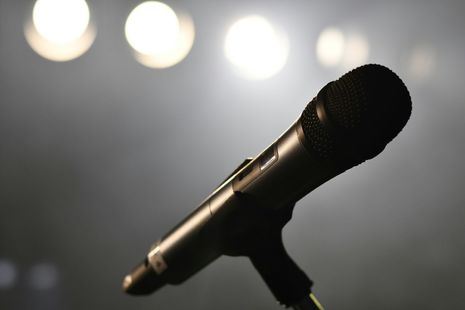Everything starts with stand-up
Freya Compton returns from the Edinburgh Fringe to discuss the past, present, and future of TV comedy

Having spent a month at the Edinburgh Fringe, watching show after show in tiny rooms, big theatres, and on the streets, some patterns begin to emerge. As always, proud performers plaster their four and five star reviews onto their posters as the month goes on, knowing flashy statements can catch eyes in such an overwhelming content-heavy environment. Certain ones stuck out to me.
My eyes were drawn not to the heartfelt love expressed by an experienced critic, but to ‘Bound for a Netflix Special! ’ and ‘Made for TV’. I realised that in this era of ever-changing platforms and abundant content from across the globe, we are beginning to give more weight to those statements, rather than those highlighting an original authenticity.
“We aren’t taking a chance on the unusual and new- instead, investors and audiences are encouraging these mould-fitting creations”
Surely, then, it is no surprise that we find similar works on our TV screens. For example, Disney’s new series Adults appears not as the funny timely Gen-Z sitcom it hoped, but rather a crude modern-day interpretation of Friends, opening on the all-too-familiar scene of a bunch of 20-somethings intertwined in a city that somewhat fails to pass as New York, sharing belongings and references in the way other generations assume Gen-Zers do. We aren’t taking a chance on the unusual and new – instead, investors and audiences are encouraging these mould-fitting creations.
It shows not just in TV productions, but the initial performances too. There has been a noticeable uptick in comedic storytelling shows subtly mirroring Fleabag, or with a not-so-unique musical twist, which have begun to outnumber the range of unusual stand-up shows. These sets too, whilst almost always earning some laughs, begin to blend in, as they follow the trend of exploring personal trauma to just the edge of what’s ‘TV-appropriate’.
While it’s ignorant to say that the Fringe is losing any authenticity – it certainly isn’t, as the many heartfelt theatre shows and touching performers have shown me – the comedy often seems to follow a pattern. Stand-up acts give different takes on the same gag, talking about Gen Z and sex. It’s not necessarily that comedy is now considered just another route into television stardom, but it’s certainly becoming a larger part of the goal.
When you look deeper, it’s clear the TV industry has changed on and off-screen comedy in several ways. Netflix specials starring the likes of Jack Whitehall promote certain personality types. Rising production costs are taking away the normality of reliable, long-running BBC sitcoms, to be replaced by limited series which may well be hilarious, but are tainted by caution to ensure success follows the investment. Scenes are even being written to fit short-form online content where they can gain more traction, and in the process, we lose the charm of ordinary settings and the characters they produce.
“It’s not necessarily that comedy is now considered just another route into television stardom, but it’s certainly becoming a larger part of the goal”
What does this mean for the future of British comedy, on-screen and off? Do we have to push back against the televising effect on classic stand-up, or must we embrace the change?
Fringe comedy is special because it’s where the weird and wonderful can shine. Every possible idea is showcased, even if you have to sift through some carbon-copy performances to find it. Cleverly, and more importantly, hilariously, these brave individuals bare their souls, and draw us into a diverse world of experiences and backgrounds that we just don’t see enough of in British TV comedy. Not just through storytelling their life to us, but by creating brand new stand-up styles or novel takes on political comedy. That vibrancy and freshness is what’s missing from our TV screens, and we won’t find it in the same formats and tired comedic topics which are backed for being financially safe. We can’t give up on what stand-up has to offer TV comedy, but we have to give it room to blossom without industry standards being manipulated for TV’s benefit.
I would argue that it’s naïve to ignore the fact that festivals like the Edinburgh Fringe have always been stepping-stone platforms for performers, and that TV comedy is based on relatable, shamelessly honest experiences in the same way live stand-up is. But there’s no denying that in an era of intense scrutiny, narrower opportunities, and huge financial barriers, the creative industry is beginning to see convergence in its comedy outputs. When searching for the next comedic star we must look farther than the host of middle-aged white men trying to prove that they’re feminists, and to do this we have to take chances on the acts that are less immediately suitable to our screens.
Hopefully, in return, we’ll receive new lovable personalities expressing the honest creativity that audiences still clearly crave.
 News / Cambridge academics sign open letter criticising research funding changes22 February 2026
News / Cambridge academics sign open letter criticising research funding changes22 February 2026 News / University Council rescinds University Centre membership20 February 2026
News / University Council rescinds University Centre membership20 February 2026 News / Supporters protest potential vet school closure22 February 2026
News / Supporters protest potential vet school closure22 February 2026 News / Hundreds of Cambridge academics demand vote on fate of vet course20 February 2026
News / Hundreds of Cambridge academics demand vote on fate of vet course20 February 2026 Comment / A tongue-in-cheek petition for gowned exams at Cambridge 21 February 2026
Comment / A tongue-in-cheek petition for gowned exams at Cambridge 21 February 2026








